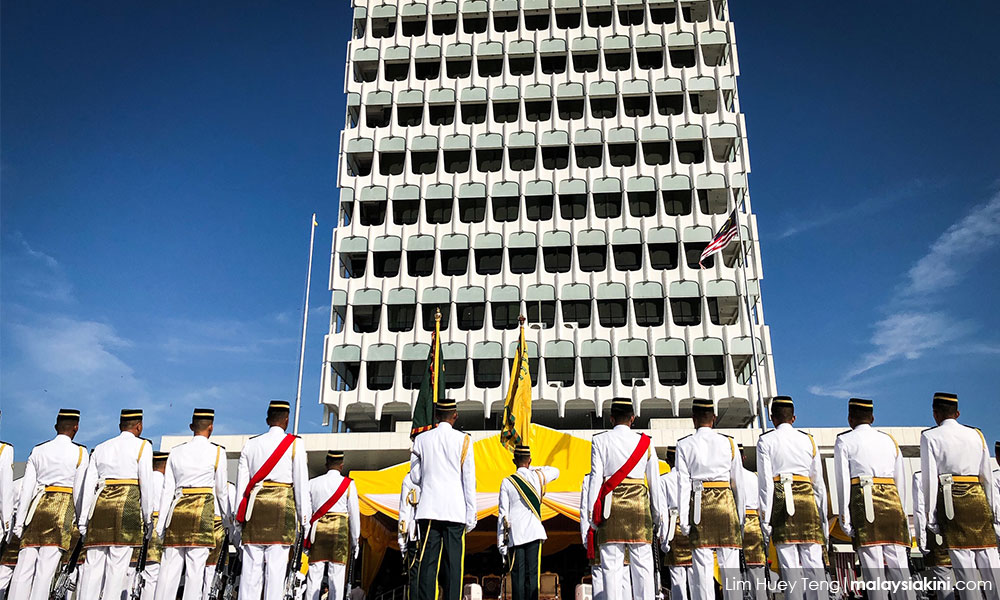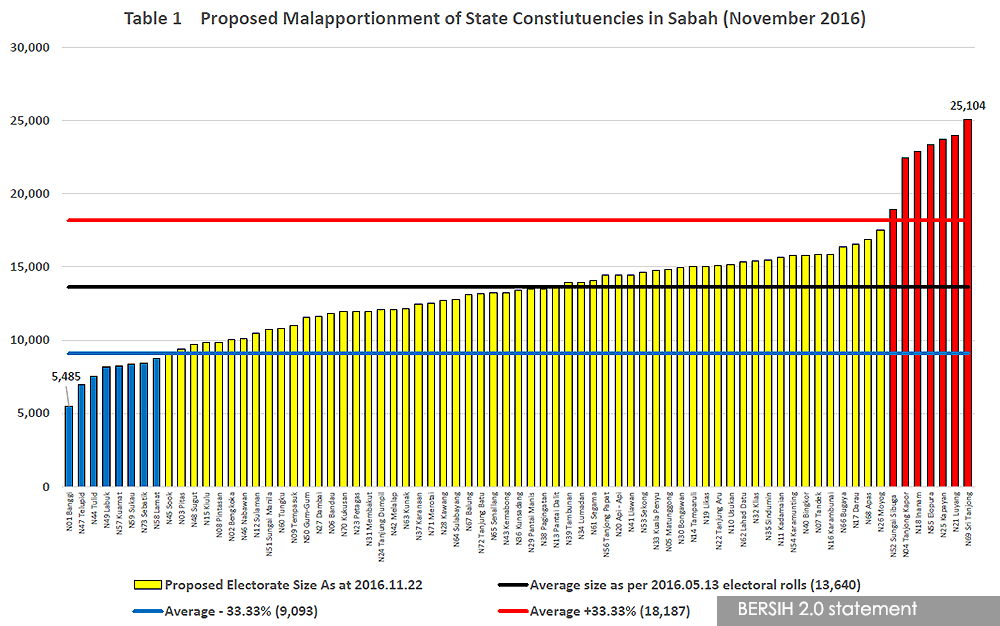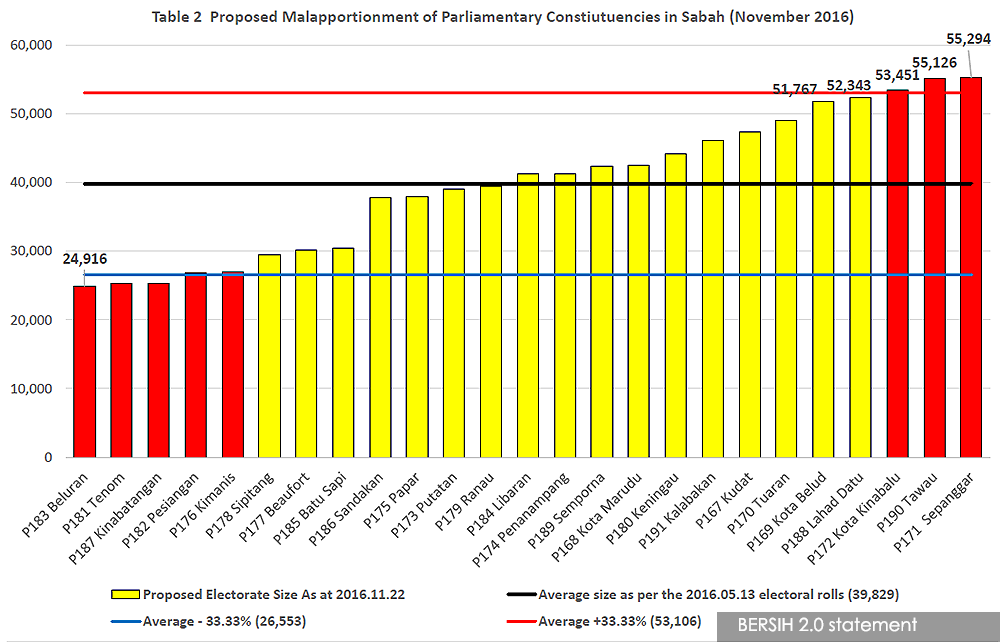COMMENT | The Coalition for Clean and Fair Elections (Bersih 2.0) calls on Prime Minister Dr Mahathir Mohamad to drop the obsolete 2017 delimitation proposal for Sabah.
The government will table on July 17 a motion that will increase the state seats in Sabah from 60 to 73.
Bersih 2.0 calls upon the prime minister to withdraw the malicious and flawed proposal from Dewan Rakyat. Previous federal governments have caused uncountable episodes of pain to Sabah with bad and wrong decisions. This must not be another.
Instead, a pledge under Promise 17 in the Buku Harapan should be made a reality: “The Pakatan Harapan government will ensure a fair ratio in future delineation exercises. We will announce transparently to the public the formula being used to determine the number of voters and the size of each constituency.”
If the proposal is not withdrawn, Bersih 2.0 urges all parliamentarians who believe in democracy to vote against it. Specifically, the 25 Sabah parliamentarians must not vote to adopt the plan that disadvantages Sabahans, especially its youth.
Sabah delimitation proposal is obsolete
Bersih 2.0 reminds the prime minister that the government’s bold moves to lower the voting age from 21 to 18 and allow automatic registration will expand the electorate by 8 million, adding to the current 14.9 million.
As the electorate expansion will exacerbate malapportionment, all states with poorly appropriated federal and state constituencies should have another round of delimitation after both the lowered voting age and automatic registration are fully implemented.
Therefore, implementing the 2017 delimitation proposal for Sabah will be wasting EC resources and inconveniencing all stakeholders if another round of redelineation will have to start soon. Notably, the old proposal is based on electoral rolls dated May 13, 2016, then with a total of only 995,729 voters.
If the 2017 proposal is put in place and kept effective till 2025, the lowering of voting age will become a farce when excited new voters in urban areas find out their ballot is worth less than 1/5 or 1/6 of rural voters. The government and the Youth and Sports Ministry will bear the brunt of the youths’ anger.
The old proposal embodies severe malapportionment
Bersih 2.0 points out that, as per the Election Commission (EC)’s proposal in November 2016, Sabah’s largest state constituency, N69 Sri Tanjung, would have 25,104 voters, or 4.5 times the number of voters in the state’s smallest constituency, N01 Banggi, with only 5,485 voters.
Altogether, the seven largest state constituencies would have more than twice as many voters as the eight smallest state constituencies. (Table 1)
The disparity amongst parliamentary constituencies is also severe, with the semi-urban P171 Sepanggar (55,294), the rural P188 Lahad Datu (52,343) and the semi-rural P169 Kota Belud (51,767) having more than twice the electorate as the rural P183 Beluran (24,916). (Table 2)
The previous EC’s deliberate plan to malapportion parliamentary and state constituencies in Sabah was meant to not only distort Sabah electorate’s choice, but also to maliciously sow division and discontent between regions and communities in the state, to facilitate the “divide and rule” scheme by powers outside Sabah.
The expansion of the electorate with a lower voting age and automatic registration may add some 300,000-400,000 to Sabah’s 1,117,337 voters by 2018. As these newly eligible citizens disproportionately live in urban centres, malapportioning insidiously planned by the previous EC will only get worse.

Fresh delimitation necessary for Sabah
The EC submitted the delimitation proposal to former prime minister Najib on 14 Feb 2017, but the latter did not table it in Parliament, exploiting a loophole in Section 9, the 13th Schedule of the Federal Constitution which does not set a deadline, but merely states “as soon as may be”. Unintentionally, Najib kept the door open for Sabah’s redelineation to be done right.
Bersih 2.0 expresses deep regret that both the prime minister and the Sabah State Assembly have not been given proper advice to make the best decision for Sabah electorate on this matter. Both the prime minister and Sabah State Assembly can work together to empower Sabahans, especially those aged 18-21 who will soon be enfranchised.
First, Bersih 2.0 calls upon Mahathir to withdraw the 2017 delimitation proposal in Sabah from Dewan Rakyat.
Second, Bersih 2.0 calls upon Sabah Chief Minister Shafie Apdal to promise another constitutional amendment to add seats in the State Legislature after the expansion of electorate. It is his moral duty to ensure that new and old voters in Sabah will be fully and equally empowered.
The Sabah State Assembly should amend the state constitution to add one or more seats to its legislature after the voting age of 18 years old and automatic registration are implemented. This would trigger another round of delimitation to be done properly and with integrity by the new EC under the reformist leadership of Azhar Azizan Harun.
Delimitation should not be made into an ethno-religious issue
Bersih 2.0 anticipates some quarters will try to turn fair representation into an ethno-religious issue and wishes to debunk such propaganda in advance. Contrary to popular misconception, the majority of urban electorates are now Malay-Muslims. The victims of under-representation of urban constituencies are no longer just the non-Malays, but also the large B40 Malay-Muslims.
The under-representation of Malay urban poor inevitably weakens their political power to improve their living standard and life chance. This will only fuel inter-class divide and hostility amongst the Malays in the longer run. Even from an ethno-centric perspective, undermining democracy is equal to undermining the Malay-Muslims’ well-being and future.
Report should be made public
Meanwhile, Bersih 2.0 also calls upon Parliament Speaker Mohamad Ariff Yusof to lift the embargo on the final version of the EC’s proposal.
The archaic practice of concealing the EC’s delimitation plan from public knowledge until the day MPs debate it has no place in any democracy. For accountability and transparency, the file of the delimitation proposal should be published in the websites of the Parliament, Prime Minister’s Department and the EC.
Like other Malaysians, Sabahans have every right to know how their political future will be decided. No federal institutions should ever prevent them from holding their parliamentarians accountable.
The views expressed here are those of the author/contributor and do not necessarily represent the views of Malaysiakini.



